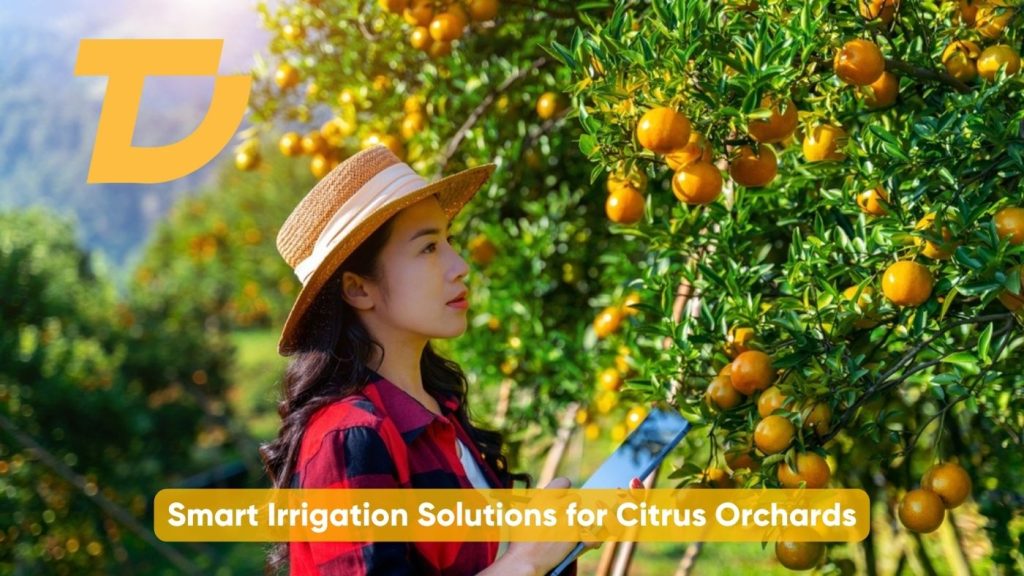Citrus orchards play a crucial role in the agricultural landscape, providing us with a rich source of vitamin C and other essential nutrients. However, managing these orchards efficiently can be a complex task, especially when it comes to irrigation.
In recent years, the integration of Artificial Intelligence (AI) into agricultural practices has revolutionized the way we approach crop cultivation. This article delves into the world of smart irrigation solutions for citrus orchards, exploring the role of AI in optimizing irrigation processes to ensure water efficiency and promote overall crop health.

The Importance of Smart Irrigation in Citrus Orchards
Water Scarcity and Agricultural Challenges
Citrus orchards, like many other crops, face the challenges of water scarcity and the need for sustainable water management. Traditional irrigation methods often result in overwatering or insufficient watering, impacting crop yield and health. Smart irrigation solutions aim to address these challenges by leveraging AI technologies to precisely monitor and control the irrigation process.
Significance of Water Efficiency in Citrus Cultivation
Water is a precious resource, and its efficient use is vital for sustainable agriculture. Citrus trees require a specific amount of water at different growth stages. Overwatering can lead to root diseases, while underwatering can result in stunted growth and reduced fruit quality. Smart irrigation systems equipped with AI algorithms enable precise control, optimizing water usage based on real-time data and environmental conditions.
Components of Smart Irrigation Systems
Soil Moisture Sensors
One of the key components of smart irrigation systems is soil moisture sensors. These sensors are embedded in the orchard soil to measure the moisture content accurately. AI algorithms analyze this data to determine the optimal irrigation schedule, ensuring that water is applied only when and where it is needed.
Weather Stations and Forecasting
Integration with weather stations and real-time weather forecasting enhances the capabilities of smart irrigation systems. AI algorithms consider current weather conditions and forecasts to adjust irrigation schedules accordingly. This proactive approach helps in preventing unnecessary irrigation during rainy periods and compensating for water requirements during dry spells.
Drip Irrigation Systems
Drip irrigation is a water-efficient method that delivers water directly to the root zone of plants. When combined with AI, drip irrigation systems can be further optimized based on the specific needs of citrus orchards. AI algorithms analyze data from soil moisture sensors and weather forecasts to adjust the flow rate and timing of irrigation, ensuring precise and efficient water delivery.
AI in Action Optimizing Irrigation Processes for Citrus Orchards
Data Collection and Analysis
Smart irrigation systems rely on continuous data collection from various sensors and sources. Soil moisture levels, temperature, humidity, and weather forecasts are among the key parameters monitored. AI algorithms process this data to create a comprehensive picture of the orchard’s conditions, enabling precise decision-making for irrigation management.
Machine Learning for Predictive Analytics
Machine Learning (ML) algorithms play a crucial role in predictive analytics for smart irrigation. By analyzing historical data and current conditions, ML models can predict future water requirements for citrus orchards. This proactive approach allows farmers to anticipate irrigation needs, preventing both overwatering and underwatering scenarios.
Adaptive Irrigation Strategies
One of the significant advantages of AI in smart irrigation is its ability to adapt to changing conditions. AI algorithms can dynamically adjust irrigation schedules and parameters based on real-time data. For example, if a sudden heatwave is predicted, the system can increase water delivery to prevent stress on citrus trees. This adaptability enhances crop resilience and overall health.
Benefits of Smart Irrigation Solutions for Citrus Orchards
Water Conservation
The primary benefit of smart irrigation in citrus orchards is water conservation. By precisely tailoring irrigation to the specific needs of the orchard, these systems reduce water wastage, contributing to sustainable agricultural practices.
Improved Crop Yield and Quality
Optimizing water delivery and ensuring that citrus trees receive the right amount of moisture at the right time directly impacts crop yield and quality. Smart irrigation solutions help in achieving uniform fruit development, reducing the occurrence of issues such as fruit splitting and sunburn.
Resource Efficiency and Cost Savings
Smart irrigation systems not only conserve water but also contribute to resource efficiency. By using AI to optimize irrigation processes, farmers can reduce the use of fertilizers and other inputs, leading to cost savings in the long run.
Remote Monitoring and Control
Many smart irrigation systems offer remote monitoring and control capabilities. Farmers can access real-time data and make adjustments to irrigation schedules from anywhere, using smartphones or computers. This feature enhances operational efficiency and allows for quick responses to changing conditions.
Challenges and Considerations
Initial Investment
While the benefits of smart irrigation solutions are significant, the initial investment required for implementing these technologies can be a barrier for some farmers. Governments and agricultural organizations may need to provide support and incentives to encourage the adoption of AI-driven irrigation systems.
Data Security and Privacy
The integration of AI involves the collection and analysis of sensitive data. Ensuring the security and privacy of this information is crucial. Developers and farmers must implement robust cybersecurity measures to protect against potential threats.
Farmer Education and Training
The successful implementation of smart irrigation solutions requires farmers to be well-versed in the use of technology. Adequate education and training programs should be in place to empower farmers with the knowledge and skills needed to operate and maintain these systems effectively.
Conclusion
Smart irrigation solutions powered by AI represent a significant leap forward in optimizing water usage and promoting the health of citrus orchards. These technologies offer a proactive and adaptive approach to irrigation management, ensuring that citrus trees receive the right amount of water at the right time. The benefits include water conservation, improved crop yield and quality, resource efficiency, and cost savings.
While challenges such as initial investment, data security, and farmer education exist, the positive outcomes observed in various case studies highlight the potential of smart irrigation solutions for the citrus industry. As technology continues to advance, the integration of IoT, edge computing, and robotics promises even more sophisticated and efficient irrigation processes, further contributing to sustainable and resilient citrus cultivation practices.
As we look to the future, the collaboration between agricultural stakeholders, technology developers, and policymakers will be crucial in ensuring the widespread adoption of these smart irrigation solutions, ultimately benefiting both farmers and the environment.






